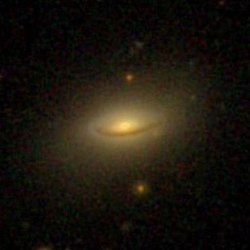NGC 4074
Appearance
| NGC 4074 | |
|---|---|
 SDSS image of NGC 4074. | |
| Observation data (J2000 epoch) | |
| Constellation | Coma Berenices |
| Right ascension | 12h 04m 29.7s[1] |
| Declination | 20° 18′ 58″[1] |
| Redshift | 0.022445[1] |
| Heliocentric radial velocity | 6729 km/s[1] |
| Distance | 310 Mly (96 Mpc)[1] |
| Group or cluster | NGC 4065 Group |
| Apparent magnitude (V) | 14.5[1] |
| Characteristics | |
| Type | S0 pec[1] |
| Size | ~100,000 ly (32 kpc) (estimated)[1] |
| Apparent size (V) | 0.35 x 0.2[1] |
| Other designations | |
| ARK 347, MCG +04-29-011, PGC 038207[1] | |
NGC 4074 is a peculiar[2][3] lenticular galaxy located 310 million light-years away[3] in the constellation Coma Berenices.[4] It was discovered by astronomer William Herschel on April 27, 1785[5] and is a member of the NGC 4065 Group.[6][7][8][9][10]
NGC 4074 is classified as a type 2 Seyfert galaxy.[3][11][2][12] It was first identified as a Seyfert in 1978.[13]
Supermassive black hole
NGC 4074 has a supermassive black hole with an estimated mass of (10×108 M☉).[14]
See also
References
- ^ a b c d e f g h i j "NASA/IPAC Extragalactic Database". Results for NGC 4074. Retrieved 2019-02-09.
- ^ a b "Sasmirala object pages". dc.zah.uni-heidelberg.de. Retrieved 2019-02-09.
- ^ a b c "Your NED Search Results". ned.ipac.caltech.edu. Retrieved 2019-02-09.
- ^ "Revised NGC Data for NGC 4074". spider.seds.org. Retrieved 2019-02-09.
- ^ "New General Catalog Objects: NGC 4050 - 4099". cseligman.com. Retrieved 2019-02-03.
- ^ Tifft, W. G.; Gregory, S. A. (1979-07-01). "Band theory applied to the Coma/A1367 supercluster". The Astrophysical Journal. 231: 23–27. Bibcode:1979ApJ...231...23T. doi:10.1086/157158. ISSN 0004-637X.
- ^ Burns, Jack O.; Hanisch, Robert J.; White, Richard A.; Nelson, Eric R.; Morrisette, Kim A.; Moody, J. Ward (1987-09-01). "A VLA 20 CM survey of poor groups of galaxies". The Astronomical Journal. 94: 587–617. Bibcode:1987AJ.....94..587B. doi:10.1086/114494. ISSN 0004-6256.
- ^ Doe, Stephen M.; Ledlow, Michael J.; Burns, Jack O.; White, Richard A. (1995-07-01). "ROSAT Observations of Five Poor Galaxy Clusters with Extended Radio Sources". The Astronomical Journal. 110: 46. Bibcode:1995AJ....110...46D. doi:10.1086/117496. ISSN 0004-6256.
- ^ White, Richard A.; Bliton, Mark; Bhavsar, Suketu P.; Bornmann, Patricia; Burns, Jack O.; Ledlow, Michael J.; Loken, Christen (1999-11-01). "A Catalog of Nearby Poor Clusters of Galaxies". The Astronomical Journal. 118 (5): 2014–2037. arXiv:astro-ph/9907283. Bibcode:1999AJ....118.2014W. doi:10.1086/301103. ISSN 0004-6256.
- ^ Helsdon, Stephen F.; Ponman, Trevor J.; O'Sullivan, Ewan; Forbes, Duncan A. (2001-08-01). "X-ray luminosities of galaxies in groups". Monthly Notices of the Royal Astronomical Society. 325 (2): 693–706. arXiv:astro-ph/0103293. Bibcode:2001MNRAS.325..693H. doi:10.1046/j.1365-8711.2001.04490.x. ISSN 0035-8711.
{{cite journal}}: CS1 maint: unflagged free DOI (link) - ^ "NGC 4074". sim-id. Retrieved 2019-02-09.
- ^ Winter, Lisa M.; Lewis, Karen T.; Koss, Michael; Veilleux, Sylvain; Keeney, Brian; Mushotzky, Richard F. (2010-02-01). "Optical Spectral Properties of Swift Burst Alert Telescope Hard X-Ray-Selected Active Galactic Nuclei Sources". The Astrophysical Journal. 710 (1): 503–539. arXiv:1001.0049. Bibcode:2010ApJ...710..503W. doi:10.1088/0004-637X/710/1/503. ISSN 0004-637X.
- ^ Weedman, D. W. (1978-07-01). "More Seyfert galaxies". Monthly Notices of the Royal Astronomical Society. 184: 11P–13P. Bibcode:1978MNRAS.184P..11W. doi:10.1093/mnras/184.1.11P. ISSN 0035-8711.
- ^ Woo, Jong-Hak; Urry, C. Megan (2002-11-01). "Active Galactic Nucleus Black Hole Masses and Bolometric Luminosities". The Astrophysical Journal. 579 (2): 530–544. arXiv:astro-ph/0207249. Bibcode:2002ApJ...579..530W. doi:10.1086/342878. ISSN 0004-637X.
External links
Wikimedia Commons has media related to NGC 4074.
- NGC 4074 on WikiSky: DSS2, SDSS, GALEX, IRAS, Hydrogen α, X-Ray, Astrophoto, Sky Map, Articles and images
